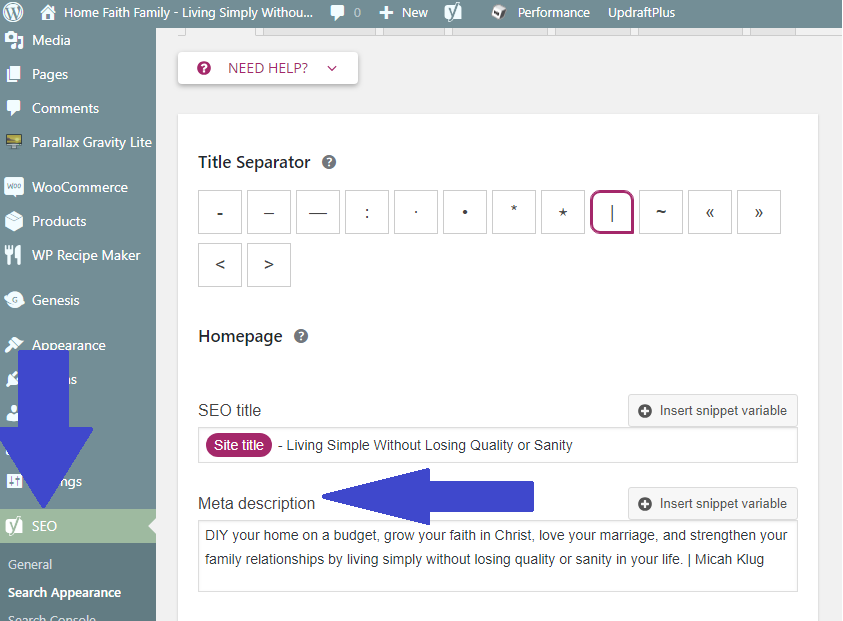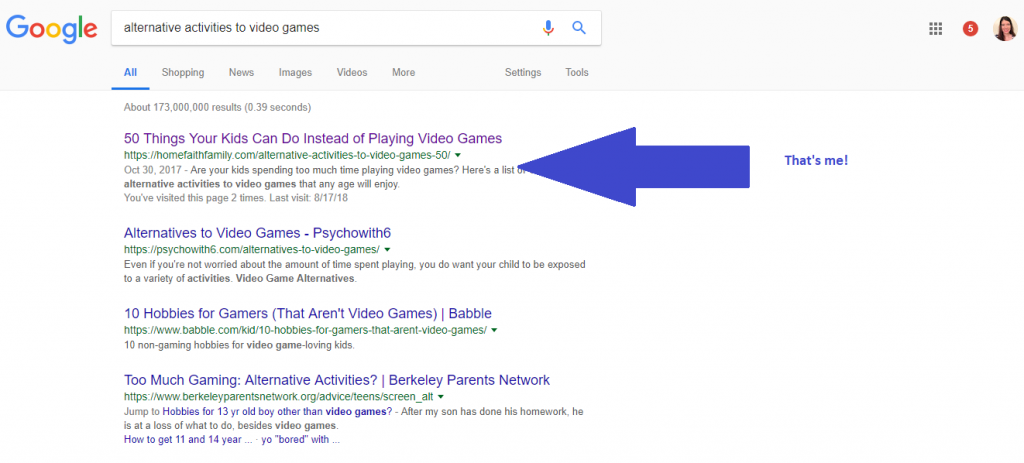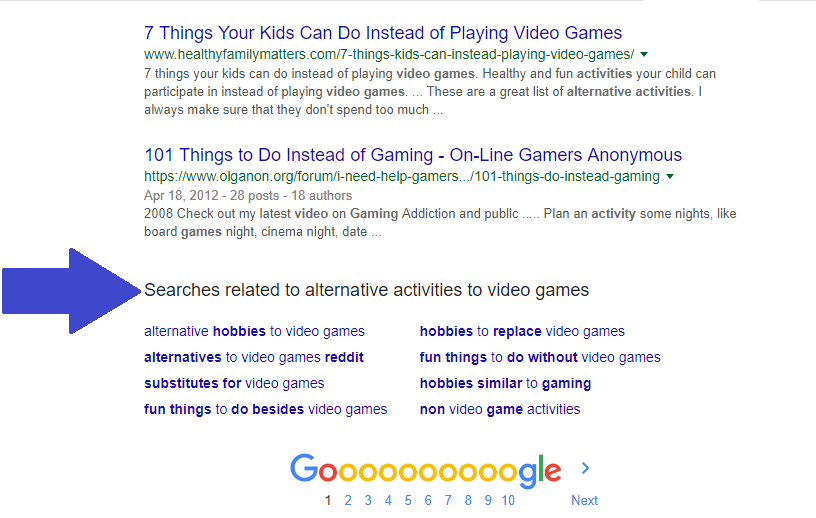
Guest post by Micah Klug from HomeFaithFamily.com
About six months into starting my blog, I had one of those unforgettable blogging moments where you can barely contain your excitement and it makes all of the work and effort invested into blogging so worth it!
I had woken up at 4 a.m. (which is when I currently get up in order to fit in time to blog!) and I decided I should check my Google Search Console and learn more about keywords.
I was so excited with what I discovered that I just couldn’t help myself… I woke my husband up and exclaimed, “Oh, my goodness, Travis, one of my blog posts is ranking in the first spot on Google!”
(Thankfully, my husband forgave me for my display of enthusiastic excitement, and I promised that I wouldn’t wake him that early in the morning again!)
How did I manage to have a blog post rank in the first spot on a Google search? Well, I could talk about searching for your perfect keywords, strategies to rank on Google, and tools you can use to help you craft your next perfect blog post, but before I do that, we first need to talk about what search engine optimization (SEO) is and why you should care about is as a blogger.
Why Does Online Marketing Matter?
I want you to imagine walking down the ice cream aisle and all you see are blank boxes that say, “ice cream” on them.
You keep looking and are starting to feel a little frustrated that everything looks the same. And then you see it — your favorite salted caramel chocolate fudge chunky flavor ice cream! You quickly grab this flavor, skip to the checkout line, and happily drive home knowing that your ice cream craving needs are met.
Now, you’re probably thinking…how on earth does this relate to SEO?
Here’s the thing: the content you publish is like these flavors of ice cream.
The more specific and intentional you are with your ideal reader, the quicker they’ll be able to find you and the sooner you’ll be able to solve their felt needs.
I’ll be the first one to admit that hearing the words “online marketing” puts a little pit in my stomach. I’d rather be diving deep into my Google Analytics and using data from my site that’s known to work.
But, when you think about online marketing as another way for having your ideal reader find your website by using Google, this term isn’t nearly as intimidating!
What Exactly is SEO?
SEO is an abbreviation for search engine optimization, otherwise known as “what people are typing into Google or Pinterest.”
For today, we are going to focus on Google SEO rather than Pinterest SEO. Pinterest SEO is similar to Google, but there are also other strategies that can be implemented to help you optimize your content for certain keywords.
How Do You Want To Be Found On Google?
In order to optimize your website, it’s important to write high-quality content, use specific keywords, and create a community where your ideal reader feels at home and wants to stay.
One of the biggest mistakes most bloggers make when writing their blog posts is that they take on the mindset of, “what keywords do I want to use to be found on Google” rather than “what is my ideal reader searching for right now?”
When you think about your ideal reader, their pain points and needs, and then start writing for them by giving them the best quality content you can, you’ll begin to target the right kind of readers.
How To Start Your SEO Journey
If you haven’t done so already, go download the Yoast SEO WordPress plug-in and activate it on your website. Yoast SEO is the top-ranked SEO plugin in the blogging industry.
I love how easy Yoast is to use. And if you’re wanting to learn more about keyword optimization, then you’ll love the tutorials and guides on their website.
Once you have this plug-in installed and activated, the next step is to optimize your website.

To do this, select the “Search Appearance” option in the Yoast plugin, and under the “General” tab find “Meta Description.”
In this area, you are going to write your blog businesses purpose using specific keywords that you want your website to target.
What you write in the “meta description” box will be pulled by Google when you do a search for your website.

Note: The changes you make in this box won’t be instantly shown in your Google search appearance, but they’ll show up over time.
What Keywords Are You Currently Ranking For?
There is a way to see some of the keywords you are ranking for within your Google Analytics, but I’m not a fan of using this route, primarily because your GA doesn’t give you the entire story.
Remember the ice cream analogy? Using GA to understand your keyword ranking is like having a very small taste of your ice cream, whereas Google Webmaster Tools: Search Console is like an all-you-can-eat buffet of ice cream.
Be sure to use the same email address for your Google Analytics as you do for your Google Search Console to connect the two accounts. (Otherwise, you’ll be logging in and out of e-mail accounts! It’s nice to have everything combined under one central Google account.)
Register Your Domain
If you haven’t signed up for an account with Google Webmaster Tools, then you’ll want to go through the steps to “Register A Property” (i.e. add your website).
After you register your website, Google will start keeping track of your keywords and website regularly. You won’t be able to see what keywords you’re ranking for just yet, but put a calendar reminder to check back in 30 days.
If you’ve had your account registered for over 30 days, then you can select “Performance” and study which keywords you’re currently ranking for on your specific website.
How Do You Know What Keywords To Use?
There are several tools — paid and free — that you can use to learn what specific keywords you should be targeting. For right now, I want to share one simple and free way to know what keywords to use for your next blog post.
The first question you’ll want to ask yourself is, “what is the purpose of my blog post?”
What specific problem are you wanting to solve? Do you want to share your favorite tips on how to pack for a family vacation when you have a big family? Or maybe you want to share your Great Aunt Jenna’s famous peanut brittle recipe?
Once you know what you want to specifically write about, you can do a quick Google search for the topic. Don’t think about how you want to be found but instead focus on the words your ideal reader is using to find great content.
For example, do you remember when I woke my husband at 4 in the morning? I’m still ranking in the number one spot for those specific keywords.

My ideal reader wants to love her family and create a home where there is love and peace. She knows her life and family aren’t perfect, but this doesn’t mean she’s going to give up on strengthening her family.
When you search for what you think your perfect keywords are, hit “enter” and then scroll down to the bottom of the search results page.

The list of keywords Google shows you under “related searches” are the specific keywords people are using to search Google to help solve their problems and felt needs. You want to use and focus on these keywords when you write your next high-quality blog post.
A Word of Caution
The last thing you want you to do is to write an okay post with specific keywords sprinkled throughout in your headers and paragraphs. Google’s algorithms are wicked smart, and they know when someone is trying to cheat the system (not that you will).
If you really want to see results in your SEO journey as you focus on targeted keywords, then focus on delivering high-quality content.
You have a story to share, advice to give, and an answer to a problem that only you can solve. But if your ideal reader doesn’t know how to find you, then you can’t deliver them the answers they’re looking for.
Optimizing your site for SEO is a marathon that takes time; it’s definitely not an instant win overnight. As you deliver great content and focus on targeted keywords, you’ll begin to find your long-term game of SEO optimization paying off as you open another avenue to growing your blog’s traffic.

This is such great advice. I keep hearing all the SEO advice but I think we often forget that we have to solve a problem for our reader and make them feel welcome, especially if we want them to come back. I recently did some in depth SEO training but I now realize I forgot my main purpose…serving my reader. SEO is important but our readers are MORE important if we want to build a community. Thanks for a great reminder. Time to get back on track!
Julie, you always do a great job serving those around you. The best part of SEO is Google rewards quality content. Keep working hard, doing good, and don’t give up, friend.
This was such a great post, Micah! And I love that advice of writing to what your ideal reader is searching for. It’s not sprinkling in keywords like a robot, but rather using those keywords to answer a burning question and solve a real problem for someone. You broke this down in such a helpful way!
And… I’m not even sure if I have Google Webmaster tools set up yet! Yikes! Need to look into that TODAY! 🙂
Beth Anne, thank you for your kind words. If you need any help with your Webmaster Tools, please let me know. ?
After blogging for over 3 years, SEO is something I’m just now diving into. For so long it seemed overwhelming to learn about. But slowly I’m grasping the concept of it an how to apply it to my writing. Thanks for these applicable tips shared here!
Thank you, Denise. If you have any questions about SEO on your journey, don’t be afraid to ask.
This is great, thank you for such great info!
Thank you for your kind words, Susie. I hope you have a great day!
Hi Micah – great article.
“Optimizing your site for SEO is a marathon that takes time; it’s definitely not an instant win overnight. ”
If more people adopted that mindset when approaching SEO they’d avoid all the frustration that comes with expectation.
The only quick wins that come with SEO are ones that can be reversed just as quickly by an algo change!
Thank you so much, Niall. Google is definitely getting smart with their algorithm. At one time a blogger could write a semi-okay post, use a ton of keywords and rank high in the search results. Now, Google expects high-quality content that focuses solely on serving the readers and answering their questions and pain points.
This takes a great deal of time, patience, and self-discipline. Have a great day, friend.
Micah,
Thanks for another great easy to understand post on analytics and SEO. Ugh, I went in and changed my metadescription! Hadn’t caught that before. After blogging for over a year and a half, I can’t quite figure out why Google is only pulling keywords on ONE of my posts. And none of my many posts on teens (that are all over 1000 words) are listed any where on the performance words for which my blog is known. Thoughts?
Hi Miranda, my friend. Thank you for your question! The first thing I would ask is if you’re using the Yoast SEO plugin? This is the best SEO plugin that will help you focus on the keywords you want to rank for. If you’re utilizing the Yoast plugin, the second thing I would ask is when the last time you submitted a site map to Google? If you have an account with Google Search Console/Webmasters Tools, then they crawl your site periodically, but if you haven’t submitted one (or need to submit a new one), I would try doing this. Let me know what other questions you have, friend.